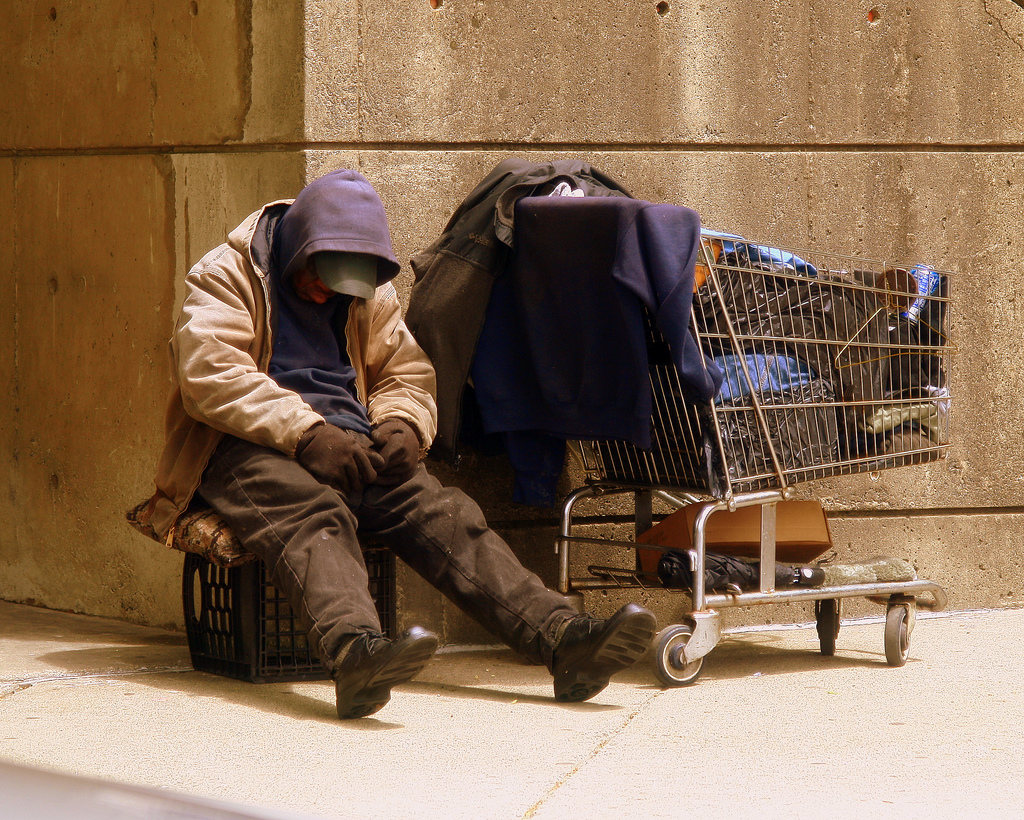Homeless in Seattle? You’d better have a good lawyer.
That’s the upshot of a series of new reports out of the Seattle University law school on the state of homelessness in municipalities throughout Washington. The reports, released from SU’s Homeless Rights Advocacy Project (HRAP), illustrate how widespread anti-homeless laws criminalize “necessary, life-sustaining activities” like sleeping and urinating by making them illegal in public without offering any alternatives.
“Visible poverty makes people uncomfortable,” says researcher and law student Scott MacDonald, a member of HRAP. “Cities are relying on criminalization to make this uncomfortable, visible poverty go away.”
MacDonald and fellow student Justin Olson authored “Washington’s War on the Visibly Poor,” one of the four reports. It comprehensively analyzes anti-homeless laws in 72 cities in Washington state. It finds that since the beginning of the millennium, laws that require homeless people to hide evidence of their poverty have proliferated, particularly in places with high income inequality. The more extreme the contrast between a city’s rich and poor, the more urgently legislators try to squeeze the latter out of existence.
Many of these anti-homeless laws designate civil infractions with financial penalties, rather than criminal ones that carry jail time. On their face, this makes them seem gentler. But read the fine print: the target of a civil infraction “does not have a right to counsel or to a jury trial,” which is why you’ve never seen a meter maid read someone their Miranda Rights. And in practice, seemingly light-handed fines can be unpayable for the homeless and can evolve into criminal charges.
One city council—not in Washington—went so far as to switch its anti-homeless laws from criminal to civil infractions, “because homeless defendants were prevailing with sympathetic juries on an anti-camping ordinance using the necessity defense.”
And for good reason: It’s often difficult or impossible for homeless people not to break these laws. For instance, Seattle outlaws public urination and defecation. But according to the report, there’s only one 24-hour public restroom downtown. Are they just supposed to hold it?
HRAP also released three other related reports. “The Wrong Side of History” shows how past anti-poor laws, which explicitly targeted certain groups and were ruled unconstitutional by the US Supreme Court, have been replaced by modern laws which are more fair-sounding but have the same practical effects. These modern laws have been motivated in part by the controversial “Broken Windows” theory of policing, which holds that aggressively stamping out small, cosmetic defects such as a broken window (or, in this case, a poor person) will signal to would-be criminals that lawlessness is not tolerated ‘round these parts.
“Discrimination at the Margins” looks at the minority groups that are disproportionately homeless and thus disproportionately affected by anti-homeless laws. A couple takeaways:
-About two-thirds of King County’s homeless are people of color, though minorities only make up one-third of the state population.
-Domestic violence is the third leading cause of homelessness for women and children.
-20 to 40 percent of homeless youth in WA and nationally are queer/LGBTQ, though they make up only 5 to 10 percent of the population.
-In some Washington counties, more than half the homeless people have a mental illness.
-Almost half of Seattle’s homeless have been incarcerated (making it harder for them to get either work or welfare).
-40 percent of homeless men, nationally and in Washington, are veterans.
But maybe you’re a Scrooge McDuck who doesn’t have heartstrings to pluck. Well, there’s a report for you too. “At What Cost” examines the fiscal impact of anti-homeless laws. Spoiler: they’re expensive as hell. In Seattle alone, “an estimated 5-year minimum of $2,300,000 is directly attributed to enforcing just 16% of the city’s criminalization ordinances,” write authors Joshua Howard and David Tran. And as the authors are at pains to note, their estimates are implausibly low due to inadequate data. Details like the labor cost of court bailiffs and court clerks, for instance, are too squishy for them to quantify, meaning that the actual cost of (even just 16 percent of) Seattle’s anti-homeless laws is quite a bit higher than $2.3 million.
There is another way, the report says. The Housing First movement “is based on the belief that first addressing and solving the primary problem of permanent housing will have a positive domino-effect, resolving many other problems that homelessness presents to homeless people and society generally.” Translation: the solution to homelessness is adequate housing—or even more succinctly: people who have a toilet don’t have to pee in the park.
One local instance of this approach is 1811 Eastlake, a Seattle “wet” unit that houses 95 alcoholics. During its first year, the unit saved taxpayers more than $4 million (albeit depriving them of the moral satisfaction of kicking drug users off the public dime). Utah, oddly enough, is the national poster-child for Housing First, as described here by the Washington Post and here by Mother Jones.
A different, even cheaper approach is encampments like Nickelsville–worse than perfect, better than nothing. These cost cities something on the order of $50 per person per month.
But if you’re not an empathy-free sociopath, it’s worth recalling that money or no money, these are human lives we’re talking about. Worth recalling, but easy not to. “We almost don’t even see [homeless people], because you don’t want to see them,” says Sara Rankin, HRAP’s advisor.
But for whatever reasons, Rankin says, we seem to have a social consensus that today’s homeless are sub-human. “We’re all complicit in persecuting some of the most vulnerable members of society,” she says.
Rankin makes this point by recalling how she was walking down the street with a friend. “There was a homeless guy with his dog. And the comment my friend made was, ‘Oh, isn’t that so sad, we should do something to help.’ And I said, ‘I know, there’s a real lack of shelters and affordable housing.’
“And she said, ‘No, I’m talking about the dog.’”








